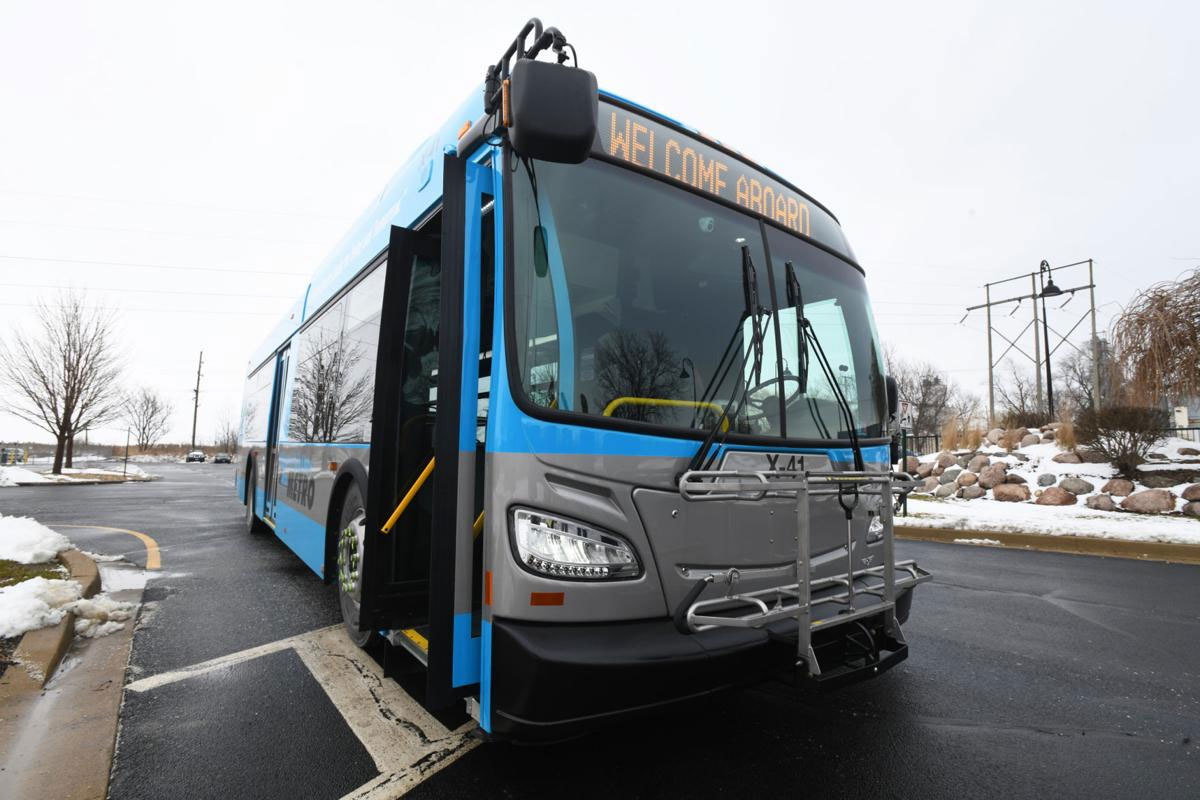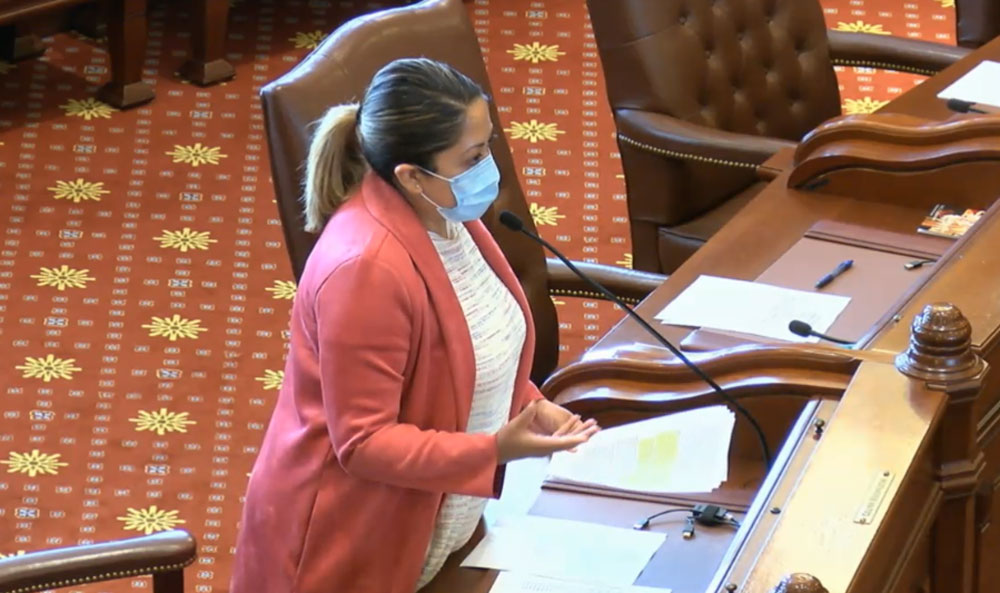- Details
- Category: Senator Elgie R. Sims Jr. News
 CHICAGO—Kankakee County will receive $82,000 to improve its mass transit system, State Senator Elgie R. Sims, Jr. (D-Chicago) announced Monday.
CHICAGO—Kankakee County will receive $82,000 to improve its mass transit system, State Senator Elgie R. Sims, Jr. (D-Chicago) announced Monday.
Sims is a member of the Appropriations I and II committees, and he is also one of the lead budget negotiators who sought funds to advance mass transit in rural communities.
“When many think of mass transit, they often think of urban areas, but it is actually a crucial resource for those living in rural areas,” Sims said. “Public transportation can be the difference in whether someone can make it to an important doctor’s appointment or provide nutritious meals for their families. I look forward to seeing how this investment helps improve the lives of people throughout Kankakee County.”
The Rebuild Illinois capital program will award $112 million to 31 downstate transportation systems. These grants are meant to help expand and improve services, provide more transit options and help improve the overall quality of life for residents.
Kankakee County’s grant will fund the replacement of a 14-passenger paratransit vehicle, which will be used as part of rural public transportation in Kankakee County.
It will also pay for the replacement of mobile radios in the county’s fleet. This will help ensure the safest and most efficient use of services in rural communities.
You can see the full list of local providers and awards here: https://idot.click/rbi-capital-plan-transit-grants
- Details
- Category: Senator Emil Jones III News
 CHICAGO – State Senator Emil Jones, III (D-Chicago) is encouraging parents who might need a little extra help preparing their young children for school to enroll in the Illinois State Board of Education’s new educational text program.
CHICAGO – State Senator Emil Jones, III (D-Chicago) is encouraging parents who might need a little extra help preparing their young children for school to enroll in the Illinois State Board of Education’s new educational text program.
“Oftentimes, we can get so wrapped up in our day that we could forget to do something as small as asking our kids how their day went,” Jones said. “However, providing parents with a reminder via text and prompts to engage with their children is a useful tool in encouraging parents and children to prioritize those conversations.”
The Chat2Learn Program — spearheaded by ISBE and the Behavioral Insights and Parenting — will engage up to 50,000 parents and caregivers of preschool-aged children in Illinois Preschool For All and Preschool For All Expansion programs. Program administrators are encouraged to sign parents up on their behalf. However, parent-enrollment will open at a later date.
Through conversation prompts given to parents through the program, future students will build literacy, mathematics, and social-emotional skills for kindergarten readiness. The messages are based on research evidence collected by the BIP Lab.
An example message is: "Part of being a parent is getting to know your child better every day. Ask your child, 'If you had a day to do whatever you wanted, what would you do?'"
Text messages begin on Dec. 6 and continue through June 30, 2021.
For more information, visit https://biplab.uchicago.edu/
- Details
- Category: Senator Celina Villanueva News
 CHICAGO – State Senator Celina Villanueva (D-Chicago) is encouraging uninsured and underinsured Illinoisans to visit the Affordable Care Act Marketplace during the open enrollment period, which runs from Nov. 1 to Dec. 15.
CHICAGO – State Senator Celina Villanueva (D-Chicago) is encouraging uninsured and underinsured Illinoisans to visit the Affordable Care Act Marketplace during the open enrollment period, which runs from Nov. 1 to Dec. 15.
“Everyone needs and deserves health insurance,” Villanueva said. “This is the time of year when you can go to the ACA Marketplace and find or change insurance if you don’t have an employer-sponsored plan and you don’t qualify for Medicaid.”
This year, Illinoisans will be able to choose from 179 plans from eight insurance providers. There are also tax credits available to help lower-income residents reduce their monthly payments and find affordable coverage.
Read more: Villanueva encourages uninsured Illinoisans to visit ACA marketplace
- Details
- Category: Senator Steve Stadelman News
 ROCKFORD – The Illinois Department of Transportation announced Friday that over $350 million in funding is set to be allocated as part of the Rebuild Illinois Capital Project. State Senator Steve Stadelman (D-Rockford) is pleased to announced that the Rockford Mass Transit District will receive a portion of those funds.
ROCKFORD – The Illinois Department of Transportation announced Friday that over $350 million in funding is set to be allocated as part of the Rebuild Illinois Capital Project. State Senator Steve Stadelman (D-Rockford) is pleased to announced that the Rockford Mass Transit District will receive a portion of those funds.
“The Rebuild Illinois project is a great way for the state to make much needed and long-overdue infrastructure improvements, and I’m pleased that the Rockford Mass Transit District will be receiving a grant,” Stadelman said. “Every day, thousands of people rely on the RMTD to get to and from home, work or school or to visit one of the countless local businesses that make our city great. With this grant, they’ll be able to provide a better and safer experience for riders, which is even more crucial during a global pandemic that is causing people to rethink their travel habits.”
IDOT will provide the RMTD with $6.85 million, which will be used for various maintenance related projects including:
- The purchase of new paratransit units and alternative fuel buses to replace existing vehicles that have reached the end of their lifespan;
- The purchase of technology, including radios, computer tablets, cameras and automatic passengers counters, to help enhance safety, improve operation connectivity, and streamline the process of transferring to the Stateline Mass Transit District; and
- The design, construction, purchase and installation of various electric and power equipment to reduce levels of energy consumption and greenhouse gas emission.
“These funds will go a long way toward helping the Rockford Mass Transit District provide a more modern, efficient service that will greatly benefit those who use the system as well as the city of Rockford as a whole,” Stadelman said.
Friday’s announcement was the first of three grant distribution cycles, with the subsequent two scheduled to be released in 2021 and 2023. A full list of grant recipients from the first cycle can be found here.
- Details
- Category: Senator Scott Bennett News
 CHAMPAIGN – The Champaign-Urbana Mass Transit District, CRIS Rural Mass Transit District, Champaign County and City of Danville were named as recipients of a combined $9.98 million grant to improve transit service throughout the community, State Senator Scott Bennett (D-Champaign) announced Friday.
CHAMPAIGN – The Champaign-Urbana Mass Transit District, CRIS Rural Mass Transit District, Champaign County and City of Danville were named as recipients of a combined $9.98 million grant to improve transit service throughout the community, State Senator Scott Bennett (D-Champaign) announced Friday.
Bennett, a member of the Senate Appropriations II Committee, worked to prioritize mass transit systems during negotiations of the landmark, bipartisan Rebuild Illinois statewide construction plan.
“Public transportation is an important resource for thousands of residents, allowing them vital access to work, school, health care and more,” said Bennett. “By prioritizing public transit and making the necessary improvements, we are giving residents the freedom and mobility to get wherever they need to go.”
Grant funds will be used for new or renovated buses, transit stations and maintenance facilities. This is the first of three grant cycles for mass transit projects through the Rebuild Illinois plan, with the next two set to occur in 2021 and 2023.
“Transit in our downstate communities can be a lifeline for getting to work or school, a doctor’s appointment or a trip to the grocery store,” said Acting Transportation Secretary Omer Osman said. “This funding through Rebuild Illinois means these providers finally will have the resources they need to improve service in communities that have not seen this type of investment for many years.”
A complete list of local providers and awards can be viewed at https://idot.click/rbi-capital-plan-transit-grants.
- Details
- Category: Senator Patrick Joyce News
 KANKAKEE – To help expand and improve public transportation, State Senator Patrick Joyce (D-Essex) announced more than $262,000 in state grants for Kankakee and Grundy Counties Friday.
KANKAKEE – To help expand and improve public transportation, State Senator Patrick Joyce (D-Essex) announced more than $262,000 in state grants for Kankakee and Grundy Counties Friday.
“Public transportation is always worth improving, because it’s something that serves everyone in our community,” said Joyce. “It’s important that we address the deficiencies in our system so that we can keep up with the needs of our residents.”
Grant funds in Grundy County will be used to replace three medium-duty buses that are beyond their useful life. In Kankakee County, grant funds will be used to replace mobile radios in the county’s fleet to ensure the safest and most efficient provision of services in the area. In addition, the funds will be put towards a new transit vehicle.
This is the first of three grant cycles for mass transit projects through the Rebuild Illinois plan, with the next two rounds set to be distributed in 2021 and 2023.
“Transit in our downstate communities can be a lifeline for getting to work or school, a doctor’s appointment or a trip to the grocery store,” said Acting Transportation Secretary Omer Osman said. “This funding through Rebuild Illinois means these providers finally will have the resources they need to improve service in communities that have not seen this type of investment for many years.”
A complete list of local providers and awards can be viewed at https://idot.click/rbi-capital-plan-transit-grants.
- Details
- Category: Member News
Legislators to work with Illinois Department of Healthcare and Family Services and community partners to build a health care system that will better serve all Illinoisans
 SPRINGFIELD – The Illinois Senate Democrats announced a new equity-centric health care plan Friday that addresses the social and structural determinants of health. State Senators Mattie Hunter (D-Chicago) and Ann Gillespie (D-Arlington Heights) look forward to working with other state leaders to bring reform to the Illinois health care system.
SPRINGFIELD – The Illinois Senate Democrats announced a new equity-centric health care plan Friday that addresses the social and structural determinants of health. State Senators Mattie Hunter (D-Chicago) and Ann Gillespie (D-Arlington Heights) look forward to working with other state leaders to bring reform to the Illinois health care system.
“We need to use an equity lens and take a fresh look at health care in our under-served communities,” Hunter said. “I look forward to working with my colleagues to invest in these necessary transformation projects, not only to level the playing field, but to create a culturally competent workforce of people who’ve faced their implicit biases and are ready to serve their communities.”
Read more: Senate Democrats announce equity-centric health care transformation plan
- Details
- Category: Senator Robert Martwick News
 CHICAGO – State Senator Robert Martwick (D-Chicago) is pleased Illinois has joined the Governor’s Challenge to Prevent Suicide, a national effort focusing on mental health support and preventative services for veterans.
CHICAGO – State Senator Robert Martwick (D-Chicago) is pleased Illinois has joined the Governor’s Challenge to Prevent Suicide, a national effort focusing on mental health support and preventative services for veterans.
“Many veterans who rely on employment through our small businesses are facing additional struggles as the pandemic continues,” Martwick said. “I am pleased Illinois continues to prioritize those who have sacrificed so much four our country by putting $2 million toward suicide prevention.”
Illinois declared $2 million to the initiative, working in partnership with Abuse and Mental Health Services Administration and the Illinois Department of Veterans Affairs. In 2019, suicide was the 12th leading cause of death among Illinois residents of all ages, but the third leading cause of death among those under the age of 24.
Illinois is the latest of 27 states to join the challenge. The State continues to prioritize mental health and preventative services and will work to implement best practices using the latest public health research and data.
More Articles …
Page 593 of 762